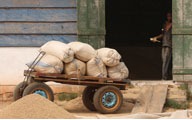
Post-Harvest Solutions Increase Profits
The Rwanda Post-Harvest Handling and Storage (PHHS) project was a 3.5-year initiative that started in September 2009. ACDI/VOCA had funding as a subcontractor to Carana Corporation. The objective of the PHHS project was to address post-harvest inefficiencies by improving storage facilities and post-harvest practices.
The PHHS project aimed to accomplish the following:
- Reduce post-harvest losses of select staple crops in targeted areas
- Increase the number of storage facilities constructed/purchased in the country
- Increase the number of Rwandan farmers using storage facilities
- Facilitate the flow of private sector funds into post-harvest infrastructure projects
- Encourage and ensure that a higher percentage of staple commodities be stored in improved storage facilities.
The PHHS approach included four components: market linkages, investment finance, post-harvest management and post-harvest policy strategy. These components worked together to lead to a reduction in post-harvest losses; an increase in storage facilities; more farmers using storage facilities; private sector funds flowing into post-harvest projects; and an increase in the weight and value of commodities entering USAID-supported storage.
The project also provided training and extension services that led to better practices for farmers seeking higher prices for better quality commodities. The PHHS project was the first to receive training through Sell More For More™ (SMFM), ACDI/VOCA’s cooperative training program. SMFM emphasizes post-harvest handling best practices alongside good governance and accountability within cooperative management. As on-farm trainings are conducted, cooperative leadership undergoes additional training in marketing, recordkeeping, operations and cost management. This ensures that the cooperatives are strategic in their operations and know what the market demands are for quality. The trainings give producers the tools they need to attain that quality. The project collaborated with the World Food Program to contract with the cooperatives so they would be assured of a buyer and thus encouraged to adopt the practices they learned during the training.
The PHHS project facilitated both short-term beneficial alliances between market actors and long-term institutional change within the staple crops agricultural sector in Rwanda. The PHHS project worked with the private sector to identify and develop strategic partnerships, new investment strategies and business ventures in post-harvest handling and storage.
Read more about Sell More For More™.





